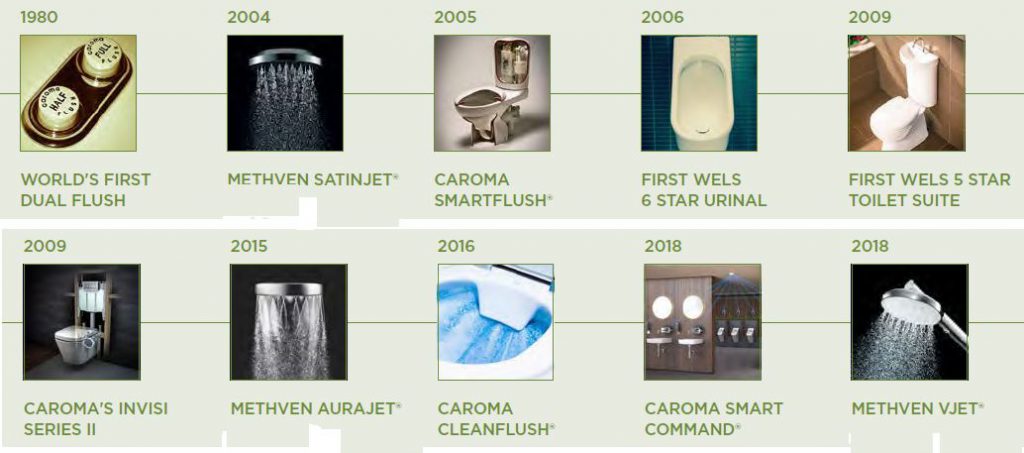Water management company GWA has produced its first stand-alone Sustainability Report. In previous years sustainability was covered in its annual reports.
The bathroom and kitchen products company says sustainability is at the core of its business, and that its objectives are to operate sustainably by managing its resources as efficiently as possible, acting in a socially responsible manner, and providing products and systems that offer better water-saving solutions. The company’s mission is to be “the most trusted and respected water solutions company”.
GWA says it is a low emitter of greenhouse gas emissions, but is working to reduce them further and encourages manufacturing and supply chain partners to do the same.
The company follows three of the 17 goals of the United Nations 2030 Agenda for Sustainable Development that are most relevant to its business. These are: ensure access to water and sanitation for all; build resilient infrastructure, promote sustainable industrialization and foster innovation; and make cities inclusive, safe, resilient and sustainable.
In 2018, GWA opened its Caroma Innovation and Distribution Centre at Prestons, NSW. This has a 2,000 square metre innovation centre for GWA’s research and development facilities. 70 people are employed at the facility.
In conjunction with the University of New South Wales, GWA has commenced a three-year study to develop better systems for the ageing population. As part of the program, new laboratory tests and monitors show how older consumers between 70 to 90 years move around their bathroom. GWA said this has enabled it to develop products to meet the specific needs of older people with mobility issues and dementia.
A major development has been the intelligent Caroma Smart Command system that incorporates Bluetooth-enabled, touchless bathroom products that are integrated into the building’s management systems to enable the monitoring and management of water.
In its own business, GWA monitors water, waste and energy useage.
GWA’s facilities consumed 6,083 kilolitres of potable water during 2018-19. During the year it installed five 10,000 litre and one 25,000 litre rainwater tanks at its Innovation and Distribution Centre at Prestons. The Centre uses recycled water for irrigation and toilet flushing, and has a 5 Star Green Star Rating. Caroma’s store at Alexandria in Sydney has water storage tanks incorporated into the showroom and these are filled from rainwater and used to run the functioning product displays. Caroma’s Norwood store in Adelaide uses recycled water for the functioning toilet displays.
GWA’s facilities produced 818 tonnes of solid waste in 2018-19. This comprised general waste, cardboard, low-density polyethylene and wood. About 716 tonnes went to landfill and 102 tonnes were recycled.
GWA is a member of the Australian Packaging Covenant (APC) and says it is committed to reducing the impacts of packaging in its business and supply chain. The company has deleted polyfoam from the packaging in a core range of products. A new program aims to reduce the volume of cardboard by reviewing pack sizes, reducing board grade thickness and downsizing where it can. Its offices and showrooms have separate waste bins for general waste and recycling, and its distribution centres have separate bins for recycling cardboard, plastics and wood. Where possible it donates obsolete stock to charity or sends it to recycling to reduce landfill.
On energy, the company is working to improve its energy efficiency. For 2018-9, the total carbon emissions from facilities were 1,451 tonnes of carbon dioxide equivalent (CO2e). This was a 75 per cent reduction on the previous year. The fall was primarily due to the sale of the Door & Access Systems business. The rest was from the implementation of energy efficiency measures.
GWA says it is identifying further energy efficiency and greenhouse gas abatement opportunities. A 250 kW solar panel system at the Caroma Innovation and Distribution Centre at Prestons has saved 293 tonnes of CO2 equivalent since its installation in July 2018. Other initiatives have been LED lighting in the warehouse and motion sensor lighting in offices.

GWA Group has a history of innovation in water-saving technologies
The company says it is committed to ethical sourcing. “At a minimum, GWA expects all suppliers to be in strict compliance to the United Nations Ethical Trading Initiatives (ETI) & International Labour Organisation Conventions (ILO),” it said. “We expect our manufacturing supply partners to comply with all laws and regulatory requirements regarding health, safety and welfare at each respective facility.”
GWA said it has a Supplier Due Diligence Policy which details its expectations from all supply partners and their sub-contractors. It conducts factory visits to supply partners to verify compliance with laws, safety conditions and its Supplier Due Diligence Policy. “All inventory supply partners must undergo a Supplier Site Visit Assessment prior to entering into purchasing arrangements with GWA.” This includes environmental criteria among a range of other ethical and sustainability factors.
The environmental criteria include compliance with national and local environmental laws and regulations; that the facility disposes of its waste in accordance with these; that the facility has identified and documented its key environmental impacts and implemented controls to minimize the impact of solid waste disposal, hazardous chemicals storage and management, air and water emissions. In 2018-19, GWA audited 19 manufacturing supply partners and said it found no material breaches.
As GWA acquired the NZ-based Methven Ltd on 10 April, Methven is not included in the 2019 Sustainability Report. (ASX: GWA)




